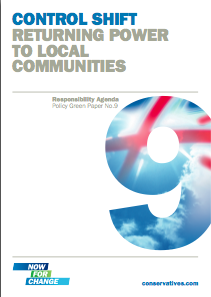 This post has been brought forward from February and updated.
This post has been brought forward from February and updated.
Conservatives want to build a stronger, safer society where opportunity and power are spread much more widely and fairly. We believe communities are strongest when everyone has a free and fair say in the decisions that affect them. From local council services and planning decisions, to local policing priorities, people should have as much power and choice as possible.
Under Labour, the rise of top-down central and regional government control has undermined local councils and allowed people too little say over decisions that directly affect them locally. Without real local democracy, communities are made weaker: social responsibility, civic involvement and the inclusion of vulnerable people in social life are all being inhibited.
This Green Paper outlines our new programme of political decentralisation to revitalise democracy and strengthen community life; a five-pillar strategy to shift power away from the central state and firmly back to local people
Launching the paper, David Cameron …
… explained that “decentralisation, devolution and empowerment” are naturally part of a Conservative approach to government, and stressed the importance of an “empowering state” rather than an “overpowering state”.
‘Control Shift’, our decentralisation green paper, outlines a series of policies that will see powers transferred from the central state to local people and local institutions
And via David Cameron: A radical power shift:
When one-size-fits-all solutions are dispensed from the centre, it’s not surprising they so often fail local communities. When people experience a yawning gap between the changes they want to see and those they can directly affect, it is inevitable that demoralisation and democratic disengagement follow.
The paper — Control Shift — is remarkable. These proposals would transform Britain, rolling back “a century of centralisation”, itself an encouraging admission of the need to make a clean break from the past. We have become too used to Labour’s “radical reform” meaning “minor organisational change”: this is different, and I recommend you discover how different by reading the proposals.